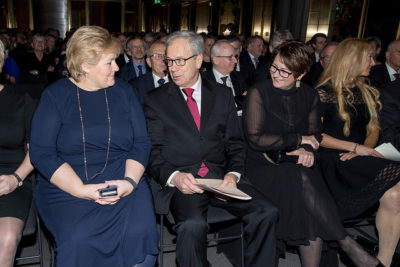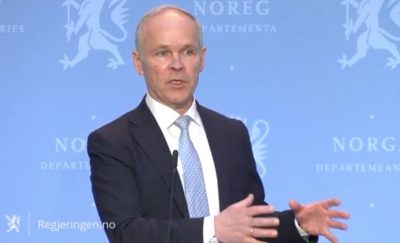NEWS ANALYSIS: While the government keeps dipping into Norway’s huge Oil Fund to finance Corona crisis aid, the fund itself has kept growing and keeping tabs on the companies in which it invests. It published its seventh report on “responsible investment” Thursday, just a week after the boss of Norway’s central bank claimed the government will ultimately need become more responsible itself, and limit withdrawals to the Oil Fund’s expected returns of just 2 percent.

Øystein Olsen, governor of Norges Bank, wasn’t able this year to invite top government and business officials to gather in person for his traditional annual address that’s followed by dinner at the Grand Hotel afterwards. Olsen did let his thoughts on the economy and government policy be known, however, and he issued a few warnings.
Olsen doesn’t think the Oil Fund, which falls under his jurisdiction, will continue to earn as much money as it has in the past. Despite an annual return of 10.9 percent last year, tied to stock market surges, Olsen cautions that returns in the future are bound to fall. The government used to be able to withdraw average earnings pegged at around 4 percent. That was lowered to 3 percent in 2017 after several years of coaxing from the central bank. Now Olsen thinks that when the Corona crisis subsides, state budgets must be tightened and only 2 percent of the Oil Fund should be tapped. Just over 70 percent of the fund was invested in international stock markets, 24.7 percent in bonds and 2.5 percent in real estate at the end of last year.

Despite the fund’s actual, spectacular growth since its establishment in 1996, Olsen thinks 3 percent annual returns are too optimistic in the long run. Low interest rates have become lower (down to null in Norway at present), not all the jobs that disappeared during Corona year 2020 will return and stock markets go up and down. Most important of all: The oil revenues stashed in the Oil Fund over the past 25 years are likely to decline in the years ahead. There simply won’t be as much money pouring in for the fund to invest.
Newspaper Dagens Næringsliv (DN) also noted that Professor Espen Henriksen of business school BI has warned that half the fund can disappear within 10 years. State budgets, at the same time, will need to contract after the past few years of expansive policy. Economist Knut Anton Mork wrote in DN on Thursday that it will be most sensible to withdraw a bit less than annual returns and keep the rest as a buffer against future declines.
The rule called handlingsregelen that regulates use of Oil Fund money was first put in place five years after the fund was established, and marks its 20th anniversary this spring. The goal was to preserve the fund for future generations’ pensions: if only its earnings are spent, the national fortune would remain intact and grow, year after year. Olsen’s message is that “we can’t expect the earnings to be as high in the years ahead,” and governments therefore can’t spend them as generously by using them to balance the state budget year after year.

That won’t be easy given the ill effects of the Corona crisis and Finance Minister Jan Tore Sanner’s reluctance to impose new taxes. He still acknowledged in his economic perspectives report earlier this month that Norway “has the world’s best starting point to handle economic restructuring (with less input from oil) and challenges.” Oil revenues will decline, he noted, and tax revenues won’t increase as much as they have earlier.
That can only mean the Oil Fund itself, which exerts enormous economic influence not only in Norway but around the world, will become ever more important and must be protected and preserved – just as soon as the government and not least Parliament stop dipping into it to finance Corona compensation packages that are being increasingly criticized as too generous and not well-targeted enough.
Oil Fund promotes ‘responsible investment’
Meanwhile, the officials at Norges Bank Investment Management (NBIM) who actually run the Oil Fund were promoting their own “responsible investment” on Thursday. They reported having had nearly 3,000 meetings last year with companies in which the fund invests, and “initiating several new dialogues.”
That’s diplomatic language for how the Oil Fund wants to prod companies into becoming more socially responsible themselves, and meeting ethical guidelines set for the fund. The fund’s managers want to see more women and minorities on boards of directors, for example, more climate-friendly business, more attention on climate risk and better sustainability reporting. They’ve also introduced what Carine Smith Ihenacho, NBIM’s chief governance and compliance officer, calls “systematic screening of the entire portfolio against our expectations,” and then following up on individual companies.
Norwegian Broadcasting (NRK) reported Thursday that the fund has, for example, sold out of a mining company because of documented damage it incurred on its local community. It sold out of 32 companies because of aspects tied to climate, social relations and management that didn’t meet NBIM’s standards. The fund reportedly has sold out of more than 300 companies since 2012.
Sell-offs prompted by tax concerns
The Oil Fund most notably dumped seven companies last year because of a lack of openness regarding tax payments or the lack thereof. The fund suspected that the companies used questionable methods to cut their tax bills. The Oil Fund thinks companies should pay tax where they do business.
“We created an expectations document last year, which addressed these concerns about tax and openness,” stated Nicolai Tangen, the former hedge fund manager who took over as Oil Fund boss last year. “We expect companies to pay tax … that they are open and that the boards are involved.”
It marked the first time the Oil Fund has sold off shares in companies because of tax considerations. Fund officials wouldn’t identify the companies or what type of business they were involved in, but they’re believed to be relatively small.
“We want to see the Oil Fund dare to take on the big companies that can be just as bad or worse when it comes to tax and openness,” Sigrid Klæboe Jacobsen of Tax Justice Network told NRK. Given controversy over how and where Google pays tax, it should be noted that the Oil Fund’s fourth-largest single stake is still in Alphabet Inc, Google’s parent company.
NewsInEnglish.no/Nina Berglund

